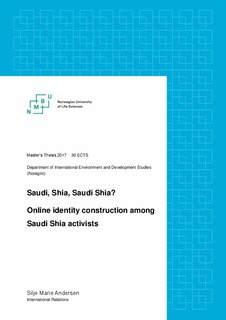| dc.description.abstract | The Saudi Shia is a little-known minority in a position of otherness in Saudi Arabia. They suffer from discrimination and are excluded from the official identity, and forced to balance national and religious (Shiite) identities. This thesis analyses a sample of tweets from three Saudi Shia Twitter activists aiming to find out whether they see themselves as Saudis, and how their online identity is expressed on Twitter. Twitter became increasingly important as a space of autonomy during the ‘Arab Spring’, which also saw protests in the Shia-dominated Eastern Province of Saudi Arabia. The theoretical framework evolves around technological context, online- and resistance identities, and aspects of communication power, particularly the concepts of frames and emotions. The study makes use of qualitative content analysis and constructivist grounded theory for coding and analysis of tweets. An important aim is to present an interpretation of the social reality of the Saudi Shia.
The thesis finds that the online identities of Saudi Shia Twitter activists are complex and manifold, and the degree to which they see themselves as Saudis is changing. The online context and the nature of online identities allows the activists to express many different aspects of identity. This is illustrated by the coexistence of Saudi and Shiite references, and the wish to be Saudi and Shia. Opposition against Saudi authorities, the official identity, and sectarianism implies that the activists do not see themselves as Saudis, if ‘Saudi’ is associated with relations and identification with the state. Thus, the ‘Saudi’ identity that my sample of Saudi Shia activists ascribe to implies cross-sectarian unity and equality with other Saudis. Existing elements of resistance- and sectarian identities in their online identities do not lead to the creation of closed communes due to the focus on Saudi unity and the rejection of a transnational Shiite identity. The Saudi Shia activists express online identity on Twitter through emotions and frames. Emotional communication describing injustice and martyrdom evokes anger and sadness, and expresses victimization, opposition against the state, and a Shiite identity aspect. Hashtags reflect a local Shiite focus, and Saudi unity. The activists construct and communicate victim-, wisdom-, and rights frames to express online identities and elements ranging from opposition against the authorities, anti-sectarianism and an identity based on Saudi unity, and the inherent right to citizenship. | nb_NO |

